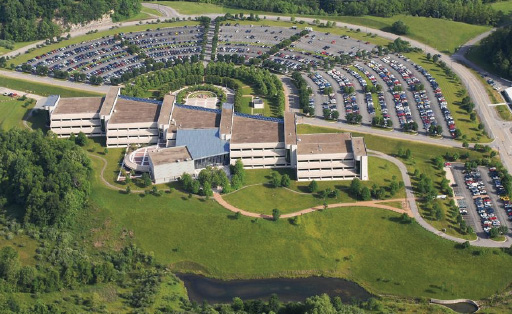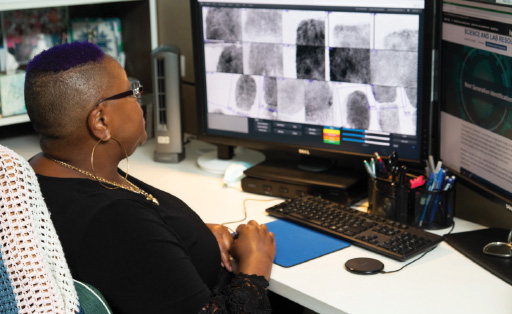Criminal Justice Information Services Division
By Olivia Miller

Tucked away in the rolling hills of Clarksburg, WV, lies a state-of-the-art, high-tech hub that most West Virginians know little about. The hub houses the FBI’s Criminal Justice Information Services (CJIS) Division and is central to combatting crime and terrorism—playing a critical role in helping strengthen national security.
The heart of the complex boasts a 500,000-square-foot main office building on a 990-acre campus and includes features such as a 600-seat cafeteria, 500-seat auditorium and 100,000-square-foot computer center.
The CJIS Division is the largest in the FBI and has one of the biggest impacts on the American people, yet people know the least about its various functions and responsibilities.
The CJIS Division is a community of more than 3,000 employees and contractors who manage seven significant FBI criminal information programs—the Next Generation Identification Iris Service, National Instant Criminal Background Check System (NICS), National Crime Information Center (NCIC), Uniform Crime Reporting Program, National
Data Exchange, Law Enforcement Enterprise Portal and National Threat Operations Center (NTOC).
The facility is staffed year-round—24 hours a day, seven days a week—analyzing fingerprints and other biometric data, processing background checks for firearm purchases, responding to tips of potential threats to the public, assisting with criminal investigations, educating law enforcement agencies about available resources and much more.
The goal of the CJIS Division is clear—daily decisions made at all levels focus on the mission of keeping the country
safe and supporting the public with a culture of good judgment, high energy, demonstrated competence and customer
service.
“We are doing great things that positively impact our partners, as well as the nation’s communities we serve,” says Assistant Director Michael Christman. “I am excited about where the division is headed.”
The CJIS Division’s NCIC maintains a criminal records database that allows for law enforcement agencies to search for information about fugitives, stolen property, missing or wanted persons, domestic violence and criminal histories.
Supporting investigations around the world requires accuracy and prompt response—there is no time to waste when people’s lives are at stake. To date, the active record count is over 17.5 million. The organization processes approximately 11 million records a day with an average response time of less than a hundredth of a second. Comparatively, in the center’s first year of existence in 1967, only 2 million transactions were processed.
As technology has evolved, so has the Biometric Services Section (BSS). Today, the BSS is best known for fingerprint processing. The CJIS Division relocated to West Virginia from Washington, D.C., in 1991. Since that time, biometric services have expanded into robust programs and include face and iris identification and palm print processing. The BSS also utilizes biometric identification to provide agencies with accurate and complete criminal history records. The CJIS Division is constantly working to improve its algorithms and identify new uses for future biometric identification.
To date, the BSS has processed more than 65 million civil fingerprints and close to 81 million criminal fingerprints. This boils down to an average of 144,534 fingerprint transactions per day. In June 2022, more than 2 million irises and 56 million palms were processed by the BSS. Additionally, more than 60 million criminal and 38 million non-criminal faces were
processed from the Next Generation Identification Face Interstate Photo System.
The support from the BSS assists criminal and non-criminal justice agencies in the prevention and disruption of criminal and terrorist activities with the adjudication of employment, adoptions and citizenship requests, as well as providing humanitarian assistance.

In the NICS, employees are processing thousands of firearm background checks every day. When an individual attempts to purchase a firearm, the seller, known as a Federal Firearms Licensee, contacts the NICS either electronically or by phone. After the necessary forms are completed, NCIS staff perform a background check to verify the buyer does not have a criminal record or isn’t otherwise ineligible to purchase or own a firearm. In July 2022 alone, almost 2.5 million background checks were processed. From January 1 to July 31, 2022, almost 19 million background checks were processed.
In a different region of campus, staff in the NTOS are busy centralizing the flow of information from the public to the FBI and disseminating the information to the appropriate FBI field office or law enforcement agency for action. Often, the threats are direct to people’s lives, and the NTOS strives to go above and beyond with every tip received. It works to proactively keep America safe by focusing on customer service and maintaining a highly trained, elite workforce.
The NTOS receives tips from the public when they call the field offices, from the 1-800-CALL-FBI phone number, and when they submit a tip via the www.tips.fbi.gov website, which results in the processing of an average of 4,500 calls and electronic tips per day. In June 2022, the NTOS received 122,752 tips.
The threat intake examiners in the NTOS handle calls and electronic tips on a wide array of issues, including possible counterterrorism, cybercrime, theft, public corruption, violent crime and various other potential federal violations. All in all, the information the CJIS Division receives, manages and shares helps prevent terrorist acts and crimes and contributes to the arrest and prosecution of criminals across the country.

The FBI CJIS Division works on many fronts, spanning the technical and the educational. The division’s employees
believe that the better they know their communities, the better they can protect them. The Community Outreach Program strives to create and strengthen relationships locally and nationally with minority groups, religious and civic organizations, schools, nonprofits and other entities. These partnerships have led to a host of crime prevention programs, enabling families in West Virginia to stay safe from fraudsters and cyber predators; businesses to protect themselves from hackers and economic espionage; schools and workplaces to safeguard against violent rampages and illegal drugs; and all West Virginia citizens to become alert to potential acts of terrorism and extremism.
For West Virginians interested in pursuing the type of work done at the CJIS facility, the CJIS Division participates in the FBI Honors Internship Program. The Honors Internship Program is a 10-week paid summer internship for undergraduate and graduate students. This summer, nearly two dozen college students spent their summer working in various units at the CJIS Division as part of the program. This fall, the CJIS Division is hosting a strategic recruitment fair for West Virginia colleges and universities for representatives to learn more about the CJIS Division and employment opportunities.
As part of extending education to law enforcement partners and colleagues about how they can utilize these vast repositories of information, the CJIS Division held the West Virginia Information Sharing Summit this past summer. The event allowed the division to showcase the tools and information the FBI can provide and to engage with partners on the frontlines working to keep communities safe.
The CJIS Division aims to equip law enforcement, national security and intelligence community partners with critical justice information they need to protect the U.S. while also preserving civil liberties. This means that they strive to share this information not only with agencies in West Virginia but across the nation to save lives and prevent crimes.








